2015
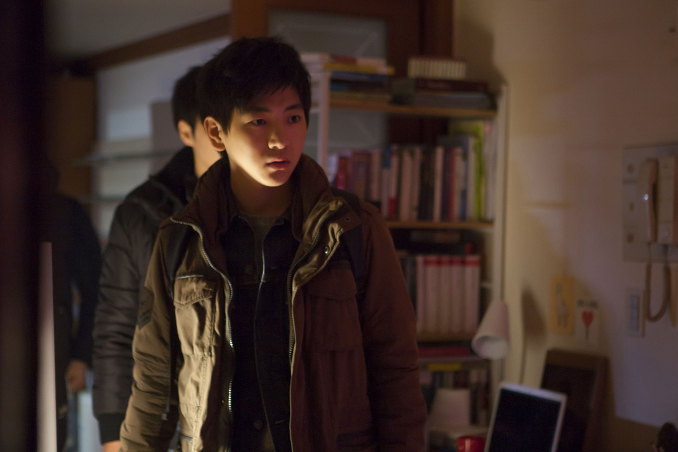
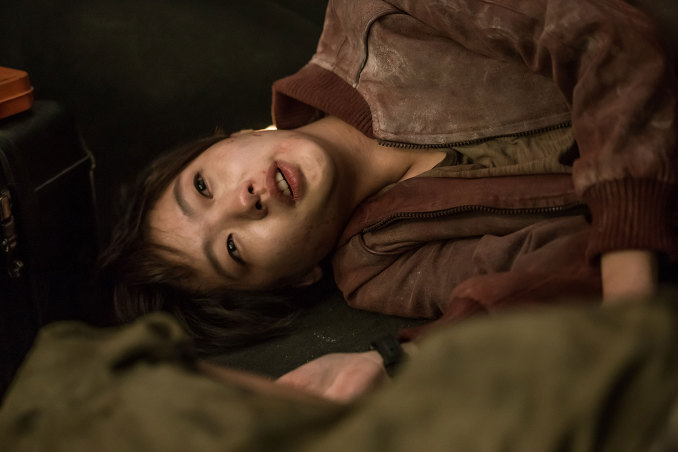
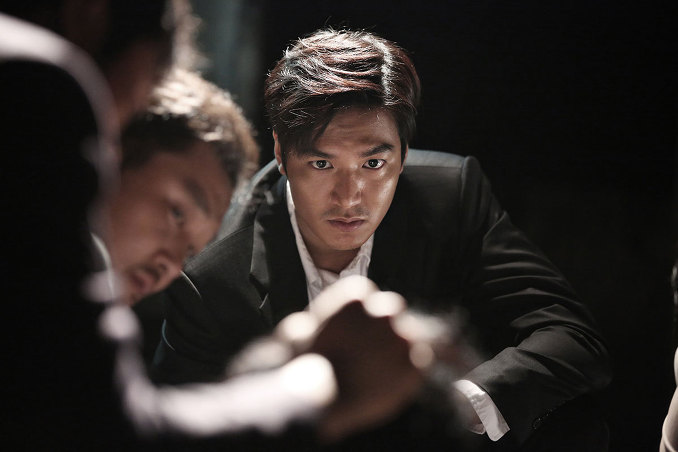
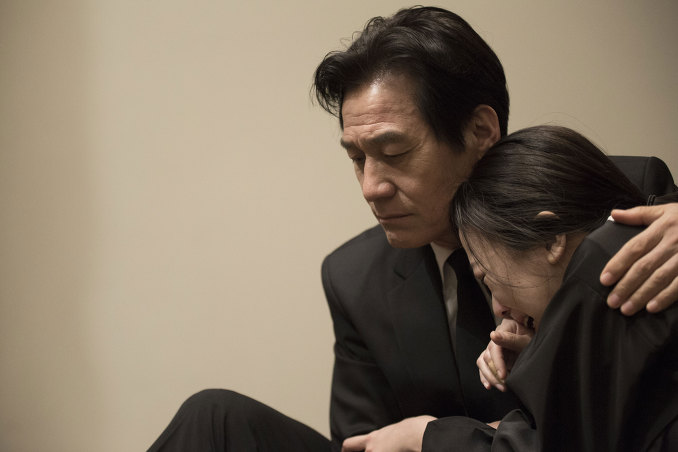
"Socialphobia", "Coin Locker Girl", "Gangnam Blues", "Revivre"
In early 2015, concerns persisted that the mainstream commercial film industry is no longer as dynamic or creative as it used to be. Not only was there a shortage of critically acclaimed films appearing in the first half of the year, but more generally, the increasingly corporatized system for making films seems to favor familiar stories, styles and casting over bold and innovative creative choices.
The independent sector, by contrast, appears to be rich with talent, but challenges exist in this realm as well, particularly in terms of reaching an audience. Apart from facing great challenges in terms of distribution and marketing, the independent sector is dealing with steep cuts in support from the government (which appears to have adopted its hostile attitude due to the criticism contained in works like documentary The Truth Shall Not Sink With Sewol).
So the atmosphere is pessimistic, but nonetheless there are high hopes for a number of films scheduled to open this year, including Ryoo Seung-wan's Veteran, Na Hong-jin's Gokseong, Shin Su-won's Madonna, among others. Even if the average Korean film is perhaps not as interesting as it was a decade ago, the highlights are still worth following. (Written on May 16)
Reviewed below: Gangnam Blues (Jan 21) The Chronicles of Evil (May 14) The Silenced (Jun 18) The Piper (Jul 9) Alice in Earnestland (Aug 13) Memories of the Sword (Aug 13) The Beauty Inside (Aug 20) Office (Sep 3) Deep Trap (Sep 10) Right Now, Wrong Then (Sep 24) Fatal Intuition (Oct 28) The Priests (Nov 5) The Himalayas (Dec 15) The Tiger (Dec 16).
| Korean Films | Nationwide | Release | Revenue | |
|---|---|---|---|---|
| 1 | Veteran | 13,414,200 | Aug 5 | 105.2bn |
| 2 | Assassination | 12,705,783 | Jul 22 | 98.5bn |
| 3 | The Himalayas | 7,759,659 | Dec 16 | 60.2bn |
| 4 | Inside Men | 7,072,057 | Nov 19 | 56.6bn |
| 5 | The Throne | 6,247,166 | Sep 16 | 48.8bn |
| 6 | Northern Limit Line | 6,044,688 | Jun 24 | 45.6bn |
| 7 | The Priests | 5,442,553 | Nov 5 | 42.4bn |
| 8 | Detective K: Secret of the Lost Island | 3,872,015 | Feb 11 | 30.5bn |
| 9 | Twenty | 3,044,859 | Mar 25 | 23.6bn |
| 10 | The Classified File | 2,860,786 | Jun 18 | 22.4bn |
| All Films | Nationwide | Release | Revenue | |
|---|---|---|---|---|
| 1 | Veteran (Korea) | 13,414,200 | Aug 5 | 105.2bn |
| 2 | Assassination (Korea) | 12,705,783 | Jul 22 | 98.5bn |
| 3 | Avengers: Age of Ultron (US) | 10,494,499 | Apr 23 | 88.6bn |
| 4 | The Himalayas (Korea) | 7,759,659 | Dec 16 | 60.2bn |
| 5 | Inside Men (Korea) | 7,072,057 | Nov 19 | 56.6bn |
| 6 | The Throne (Korea) | 6,247,166 | Sep 16 | 48.8bn |
| 7 | Kingsman: The Secret Service (UK) | 6,129,681 | Feb 11 | 50.4bn |
| 8 | Mission: Impossible-Rogue Nation (US) | 6,126,488 | Jul 30 | 48.5bn |
| 9 | Northern Limit Line (Korea) | 6,044,688 | Jun 24 | 45.6bn |
| 10 | Jurassic World (US) | 5,546,792 | Jun 11 | 47.8bn |
* Still on release. Source: Korean Film Council.
Seoul population: 10.4 million
Nationwide population: 50.9 million
Psy may have made the Seoul district of Gangnam a near-universally recognized symbol of wealth, glamour, and ostentatiousness, but it was not very long in the past that Gangnam was little more than farmland. Gangnam Blues takes place in 1970 (the Korean title is simply "Gangnam 1970"), at the critical moment when power brokers identified the area as a development zone with great potential, and frenzied real estate speculation followed.
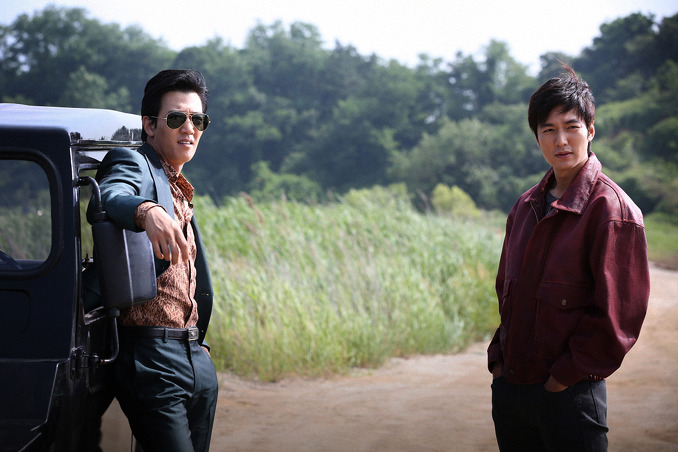 The key protagonists in this modern-day land grab were politicians, businessmen, and gang bosses, but the heroes of Gangnam Blues are quite a few steps down the social ladder. Jong-dae (popular singer/actor Lee Min-ho) and Yong-gi (Kim Rae-won) are two young men who enter adulthood as destitute rag pickers, but through a combination of ingenuity, skill, violence and grit start to rise within the heirarchies of rival gangs. Eventually, they become minor players in the drama of Gangnam's transformation.
The key protagonists in this modern-day land grab were politicians, businessmen, and gang bosses, but the heroes of Gangnam Blues are quite a few steps down the social ladder. Jong-dae (popular singer/actor Lee Min-ho) and Yong-gi (Kim Rae-won) are two young men who enter adulthood as destitute rag pickers, but through a combination of ingenuity, skill, violence and grit start to rise within the heirarchies of rival gangs. Eventually, they become minor players in the drama of Gangnam's transformation.
The gangster genre, like any genre, is known for its conventions, replicated in loving variation from film to film: low-level lighting, formal but crude-looking suits, casino/brothel/hotel businesses, contract killings, exchanged suitcases of money, room salons, the capture and torture of rival gangsters, and street battles involving guns (in Hollywood films) or knives, clubs and pipes (in Korean films). Apart from these surface details, the genre is also particularly well suited to depicting the mechanics of power: how one person outstrengths, outsmarts, buys or seduces another, within a complex overall heirarchy of power relations. The best gangster movies are just as much about money and politics as they are about violence.
Poet-turned-film director Yoo Ha has experience depicting gangsters and violence. A Dirty Carnival (2006), set in contemporary times, follows the career path of a young man who joins a criminal organization in order to cover his mother's hospital bills. Once Upon a Time in High School (2004) is not a gangster film, but it centers on school violence and is also set in the Gangnam region in the 1970s. Both films present violence not as isolated acts, but as part of an overall system in which people are driven by need, ambition and fear to exploit the weak and seek out vulnerabilities in the strong.
Gangnam Blues also proves to be a showcase for Director Yoo's vision and talent. Although it requires some concentration to follow its complex plot, the film imparts an impressive depth to the violence and deception shown on screen, as if it were all a part of a tense chess match. At the same time he devotes considerable attention to the surface: the look and energy of the film is thrilling, and the crowd fights in particular are as painful to watch as they are impressively choreographed and executed. The end result, as with his previous films, is that Gangnam Blues addresses the topic of violence in a sophisticated way, but never fully de-glamorizes it either. You could flag this as one of the work's faults, or you could argue that the contradictory feelings that the film gives you -- of being simultaneously repelled and seduced by violence -- is what makes it interesting.
As for the Gangnam district, viewers familiar with the area will find it amusing to hear the various parts of this dusty agricultural town referred to with place names now associated with Prada and Louis Vuitton. But in many ways the development of Gangnam, which was driven forward by a mixture of corruption, greed, and violence, parallels the way in which South Korea as a whole achieved its economic miracle in the second half of the 20th century. So as specific as this film might be in terms of its local details, the story it is telling is the story of a nation. (Darcy Paquet)
Soft-spoken, steely-eyed Detective Choi (Son Hyun-joo, Hide and Seek) is well admired by his colleagues, including a pretty boy rookie Dong-jae (Park Seo-joon, The Beauty Inside) and the tough guy Detective Oh (Ma Dong-seok, Deep Trap), and loved by his family. Returning from a celebration for his promotion, the detective is attacked by a thug disguised as a cab driver and kills the latter in self-defense. Choi gets rid of the body and the forensic evidence of his involvement, but to his horror, the cadaver turns up the next morning hanging from a construction crane, directly above the Gangnam police station where he works. Choi realizes that he is being set up by someone with a long-standing grudge: he traces a rare type of narcotics imbibed by the dead thug to a young actor named Kim Jin-gyu (Choi Daniel, The Traffickers), but is he behind the dastardly conspiracy? And if so, what is the reason?
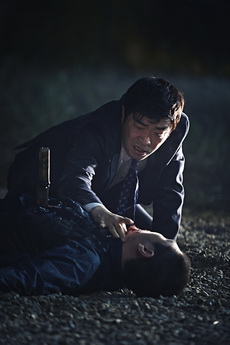 The Chronicles of Evil played in the late spring season to mixed reviews but out-performed industry expectations, raking in 2.19 million tickets and making it into the top ten domestic box office hits of 2015, just ahead of the bigger-profile pictures such as Gangnam Blues. Director Baek Woon-hak (Tube)'s screenplay is not particularly creative but wins points by keeping the narrative lean and functional, trimming tired melodramatic subplots, useless comic reliefs and even more useless scenes of cops gruffly bantering with one another and harassing suspects. In that sense, the film reflects a very welcome trend in Korean urban thrillers of recent years that emphasize professionalism and intelligences of main characters, both cops and villains, over emotional appeals of their actions or righteousness of their motivations.
The Chronicles of Evil played in the late spring season to mixed reviews but out-performed industry expectations, raking in 2.19 million tickets and making it into the top ten domestic box office hits of 2015, just ahead of the bigger-profile pictures such as Gangnam Blues. Director Baek Woon-hak (Tube)'s screenplay is not particularly creative but wins points by keeping the narrative lean and functional, trimming tired melodramatic subplots, useless comic reliefs and even more useless scenes of cops gruffly bantering with one another and harassing suspects. In that sense, the film reflects a very welcome trend in Korean urban thrillers of recent years that emphasize professionalism and intelligences of main characters, both cops and villains, over emotional appeals of their actions or righteousness of their motivations.
Son Hyun-joo, a familiar face in numerous films (Guns & Talks, The Game, Secretly, Greatly) and TV dramas (The Hourglass, Happy Together, The Chaser), won industry kudos for portraying an exhausted everyman in the hit thriller Hide and Seek (2013). Here he gives a convincing performance as an outwardly good cop, generous with his underlings and always maintaining calm exterior, yet seething with societal anxiety and moral guilt inside. If anything, Son's performance is too restrained and internally driven to be effective during the more overtly melodramatic climax, in which, as written in the screenplay, Detective Choi ought to physically show to the audience the spiritual consequences of the boomeranged trajectory of his own past actions: Son seems merely concerned rather than truly devastated (Or conversely, he could have played "cool" to the very end, ending the movie on an ambivalent note about Choi's true moral character, a choice that someone like Park Chan-wook might have leaned toward).
Park Seo-joon and Choi Daniel are both sincere and attractive, but the biggest impression among the cast is again left by Ma Dong-seok as Detective Oh, who proves a terrific and entertaining contrast to Son's Detective Choi, while delivering a huge amount of expository dialogue. There is something to be said about the lineage of outwardly burly, physically robust actors with impeccable comic timing and their contributions to the success of New Korean Cinema: Kim Soo-ro and Yun Je-mun come to mind. Ma certainly belongs to this lineage and Chronicles would not have worked half as well as it does, had he not been there to persuasively supply appropriate red herrings and effectively set up the film's big plot twist.
As a police thriller with a dash of morally complex human drama, Chronicles cannot quite aspire to the level of Mother or The Unjust, but is a solid accomplishment nonetheless. Conversely, some viewers enamored of the excess emotional gymnastics of a typical Korean TV drama might find it bland and dry. I should also mention that this film is unusual even among Korean motion pictures in that no female character of import appears, not even a token love interest. In fact, there is a clearly discernible gay flavoring to the characters (although Choi Daniel's Kim is the only one explicitly referred as such), sometimes so overt that I hesitate to call it "subtext." The film, unlike a majority of Korean cinema, posits the (single) father-son relationship, instead of the (single) mother-son one, as the core human interaction from which one's social identity is constructed: as an object of queer-theory psychoanalysis Chronicles could prove to be a richly symptomatic text. Is the film saying that lack of proper "fatherly love" turns young men into "deviant" (and criminal) homosexuals? Or the exact opposite of it, that failure to acknowledge "love" for his "surrogate son" was the source of Choi's moral hypocrisy? An interesting point to ponder, yet there is little question that the emotions Chronicles invokes out of its male-to-male relationships are predominantly sadness and desolation. (Kyu Hyun Kim)
Colonial Korea, 1938. A beautiful but tubercular young girl, Juran, called by her Japanized name Shizuko (Park Bo-young, A Werewolf Boy), is sent to a boarding school, Kyeongseong Academy, located deep in the mountains. The president of the academy (Uhm Ji-won, Like You Know It All), glamorous and suave, is allegedly running a military-sponsored educational program that will result in two students to be sent to Tokyo on full scholarship. Juran is harassed by the bitchy Yuka (Gong Ye-ji, Shuttlecock) but becomes a fast friend with In-deok, a.k.a. Kazue (Park So-dam, Ingtoogi), a star athlete of the school. Juran soon learns that there was another girl named Shizuko who had mysteriously disappeared, after showing some strange symptoms, such as imperviousness to physical pain. When more classmates disappear under mysterious circumstances, Juran and In-deok together investigate a dark secret behind the president's "program," and the terrifying fates awaiting its candidates.
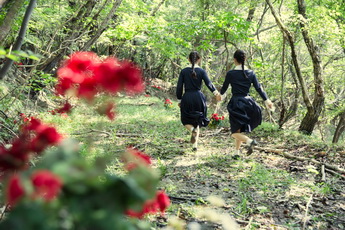 Lee Hae-young, one-half of the ace screenwriter team with his partner Lee Hae-joon (their co-screenplay credits include Conduct Zero, Arahan, Kick the Moon and Like a Virgin), has gone solo since 2010, writing screenplay for the controversial 26 Years and directing Festival. Both Lee and his erstwhile partner Lee Hae-joon (Castaway on the Moon) can be relied on for their rich understanding of a wide range of genres and open-minded perspective that restores humanity to the spurned minorities of the Korean society. Lee Hae-young's new project as a writer-director is certainly unique. It starts off pushing all the expected buttons for a young-girl-in-school-uniform K-horror, but then it veers sharply off into a completely different sub-genre (to concretely name that would in fact constitute a major spoiler), ironically one that you might easily expect from Japan (Kaneko Shusuke, one of the doyens of the Japanese tokusatsu cinema, in fact recently made one film in this mode).
Lee Hae-young, one-half of the ace screenwriter team with his partner Lee Hae-joon (their co-screenplay credits include Conduct Zero, Arahan, Kick the Moon and Like a Virgin), has gone solo since 2010, writing screenplay for the controversial 26 Years and directing Festival. Both Lee and his erstwhile partner Lee Hae-joon (Castaway on the Moon) can be relied on for their rich understanding of a wide range of genres and open-minded perspective that restores humanity to the spurned minorities of the Korean society. Lee Hae-young's new project as a writer-director is certainly unique. It starts off pushing all the expected buttons for a young-girl-in-school-uniform K-horror, but then it veers sharply off into a completely different sub-genre (to concretely name that would in fact constitute a major spoiler), ironically one that you might easily expect from Japan (Kaneko Shusuke, one of the doyens of the Japanese tokusatsu cinema, in fact recently made one film in this mode).
Lee is a talented filmmaker and lets the creative juices flowing among the production staff and the young cast (who, despite their convincing performances as teenagers, are mostly in late twenties, as of 2015). DP Kim Il-yeon (Hide and Seek) and Lighting Director Kim Min-jae (The Front Line) provide striking visuals, including breathtaking aerial shots of the Academy and the surrounding forests, reminiscent of The Shining's (1980) opening sequence. Han A-reum (Another Family) and production design team, including the company Manjijak, responsible for a wonderful collection of colonial-period props, work overtime to create an exquisitely ordered yet slightly sinister-looking environment. Park Bo-young is appropriately subdued and fragile, but is somewhat disappointing after her "transformation" in the latter half: she should have been a lot spunkier or conversely a lot scarier, the way I would imagine Im Soo-jung or Kim Ok-vin to be in her shoes. Among the cast members, the strongest impression is left by Park So-dam, whose earnest, slightly quizzical expression is sometimes heart-breakingly attractive.
Given its innovative (some might say "random," in the lexicon of the North American young) splicing of different genres, The Silenced ought to be much more entertaining, transgressive or poignant than it actually is. The problem is that Lee attempts to wrap up the story in a neat package in the last thirty minutes and the effort backfires: he lets the stereotypes-- complete with asinine Japanese soldiers played by Korean actors with terrible accents and intonation-- overtake the characters, ending the film in a kind of we-done-everything-we-were-supposed-to-do stupor and a vacuous coda. As a genre film that attempts to dissect the colonial experience of the Koreans, The Silenced cannot hold a candle to the Jeong Brother's Epitaph, although its remarkable beauty and daring mix-and-match of genres do make it worth seeing at least once. (Kyu Hyun Kim)
In the mountains somewhere in South Korea, early 1950s. An itinerant entertainer U-ryong (Ryu Seung-ryong, The Admiral: Roaring Currents) is traveling to Seoul with his little son Young-nam (Goo Seung-hyun, Secretly, Greatly) to have the latter cured of tuberculosis. The father and the son decide to stay overnight at an isolated village, presided by a smarmy but jackal-eyed old man (Lee Sung-min, Howling, The Attorney) and his handsome but thuggish son (Lee Joon, Rough Play). The villagers are weirdly twitchy but otherwise reasonably accommodating to the two strangers. The beautiful young shaman Mi-suk (Chun Woo-hee, brilliant in Han Gong-ju) takes on the role of a surrogate mother to Young-nam.
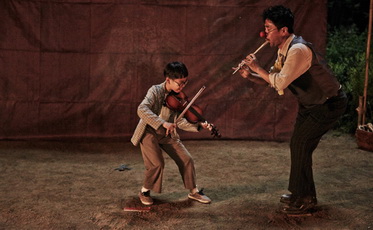 Unfortunately, the village has a serious pest problem... specifically rat infestation. In a scene that will surely drive many viewers to immediately reach for their remote, along with muttered cusswords, U-ryong and his son learn to their horror that villagers are breeding and slaughtering cats to feed the hungry vermin: it's either that or the rats will turn their fangs toward the elderly or children. The entertainer proposes a solution. He will round up and seal all the rats in an underground cavern, using his folk medicine skills and musical talents. He succeeds, but unfortunately he also ends up learning the dark secret behind the rat infestation, something that the old man and other villagers would kill to keep the outside world from knowing.
Unfortunately, the village has a serious pest problem... specifically rat infestation. In a scene that will surely drive many viewers to immediately reach for their remote, along with muttered cusswords, U-ryong and his son learn to their horror that villagers are breeding and slaughtering cats to feed the hungry vermin: it's either that or the rats will turn their fangs toward the elderly or children. The entertainer proposes a solution. He will round up and seal all the rats in an underground cavern, using his folk medicine skills and musical talents. He succeeds, but unfortunately he also ends up learning the dark secret behind the rat infestation, something that the old man and other villagers would kill to keep the outside world from knowing.
The Piper is, of course, a retelling of the Pied Piper of Hamelin: as fairy tales go, this is one of the darker ones, what with its association with the Black Plague, and the unconventional denouement in which children are essentially mass-kidnapped. The existing film versions in fact tend to reflect this uncomfortable quality of the original tale: even Jacques Demy's semi-musical with Donovan (1972) left many viewers expecting an entertaining fluff shocked with its unflinching portrayal of the ugly medieval mindset, not to mention the touted Czech animated version directed by Jiri Barta (1968), extremely scary and psychologically realistic, characterized by visual invocation of authentic medieval arts such as wooden picture panels.
There is a sense, especially in the first third of the film, that director Kim Gwang-tae (previously assistant director to Lee Han in Almost Love [2006]) wanted to go for a kind of conte sauvage feel, wherein the viewers are not quite sure whether to find proceedings charming or disgusting. When U-ryong begins to herd hundreds of CGI-rendered rats into the cave, the tone is not that much removed from similar scenes from the feel-good fantasy Welcome to Dongmakgol (2005). However, Kim is unable to continue his tightrope-walking and soon lets the film slide into the out-and-out horror territory. Needless to say, any viewer who finds the sight of rats disgusting should avoid this film like a plague: let me reassure you that a baby does not get eaten by the rats (well, at least such a situation is not explicitly depicted on screen), but many other cast members do get nibbled, gnawed, chewed by our tiny, bewhiskered friends.
Kim's objective is not difficult to discern: he wanted a reverse take on Dongmakgol, with the rats obviously standing in for "ideological infestations of mind" that have resulted in fratricidal atrocities committed by both Northern and Southern Koreans before and during the Korean War. Lest we miss the metaphor, Kim spends a substantial running time dramatizing the old man's efforts to exert ideological control over the villagers, and then to frame U-ryong as a Commie. However, unlike Dongmakgol, full of witty dialogue and sharp character observations derived from Jang Jin's screenplay, The Piper cannot quite work up the same level of dramatic energy or, for that matter, laid-back humor.
Both Ryu Seung-ryong and Lee Sung-min are fine in their respective roles, but their characters are flat, two-dimensional: more cyphers created to follow through Kim's authorial intentions than fully-formed personages. Chun Woo-hee's Mi-suk is also disappointing, ultimately having little function in the story other than foretelling the coming of an inevitable horror-show climax. The child actor Goo comes off best, including his restrained acting in a sad scene that borrows an idea from Song Il-gon's Spider Forest (2004).
The Piper is in the end most effective if taken as a straightforward horror film. While the CGI-drawn rats are suitably disgusting, they lack the raw impact of well-wrangled real animals. Given the excellent quality of makeup effects (the film features a group of lepers as well as convincing flesh wounds) supervised by Lee Ji-soo, a greater focus on mechanical or physical effects might have been a better choice. More striking are the flashback to the origins of the rat problem, dominated by a cackling shaman (Kim Young-seon) with seemingly genuine supernatural powers.
The Piper, like many Korean genre films derived from folktale or classic literature, displays great fidelity to its source (unlike the test-screening-driven Hollywood adaptations) and ends in an extremely disturbing symbolic sequence that seems to argue that the victims have become new victimizers, and the cycle of deception and exploitation will continue into the future (or has continued into the present-day Korea). Its bleak vision makes sense as a metaphor for the fratricidal history of the Korean War. It's too bad that director Kim could not turn that vision into a compelling dark fantasy, letting it overwhelmed by the visceral horror more disgusting than frightening. (Kyu Hyun Kim)
Ahn Gooc-jin's debut film Alice In Earnestland is a lovely addition to what a significant segment of the international audience has flocked to New Korean Cinema for, the Western marketing of the 'Asian Extreme' moniker. Alice in Earnestland is a bit creepy, a bit gore-y. Thankfully, in this case, the gore is not overdone. We are not pummelled with punished characters but with plausibly paced plow throughs. Still, the film is not for the easily squeamish.
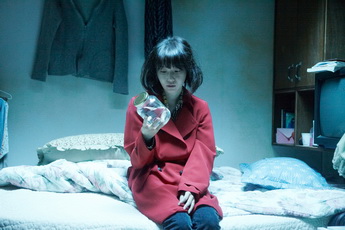 Our Alice tripping down this rabbit hole here is Soo-nam (Lee Jung-hyun - A Petal & Juvenile Offender). We first meet her through her sartorial and transport choices. We witness both as the camera focuses on her foot as she parks her motorized scooter before we see her face. Like the gore, her quirky outfits are not overdone, but her clothes and her primary mode of transportation puts her outside the mainstream. We immediately peg Soo-nam as strange. But her strangeness is tempered somewhat since she is quickly placed in a dyad with Kyung-sook (Seo Young-hwa - 4 Hong San-gsoo films, including Hill of Freedom & Right Now, Wrong Then), a counselor whose manner of speaking and facial grooming presents her as strange in her own way as well. We immediately begin to wonder what Soo-nam's beef is with Kyung-sook when we witness Kyung-sook tied up in her chair and across from her desk sits Soo-nam eating a boxed lunch. A nicely edited back story takes us through Soo-nam's adolescence and young adulthood to where she marries Kyu-jung (Lee Hae-young - Glove & The Himalayas). After putting themselves in debt by buying a house, Kyu-jung develops hearing loss. Rather than encouraging the learning of Korean Sign Language, the couple is pushed towards a cochlear implant, and hence further debt, but are warned that the procedure isn't perfect. There might be consequences. Alice in Earnestland proceeds to deliver on those consequences, much of which has to deal with housing speculation. If there isn't already a film studies scholar writing a book on the presentation of the housing market in South Korean cinema, all I ask is the eventual writer of such a treatise thank me in the acknowledgements for the idea.
Our Alice tripping down this rabbit hole here is Soo-nam (Lee Jung-hyun - A Petal & Juvenile Offender). We first meet her through her sartorial and transport choices. We witness both as the camera focuses on her foot as she parks her motorized scooter before we see her face. Like the gore, her quirky outfits are not overdone, but her clothes and her primary mode of transportation puts her outside the mainstream. We immediately peg Soo-nam as strange. But her strangeness is tempered somewhat since she is quickly placed in a dyad with Kyung-sook (Seo Young-hwa - 4 Hong San-gsoo films, including Hill of Freedom & Right Now, Wrong Then), a counselor whose manner of speaking and facial grooming presents her as strange in her own way as well. We immediately begin to wonder what Soo-nam's beef is with Kyung-sook when we witness Kyung-sook tied up in her chair and across from her desk sits Soo-nam eating a boxed lunch. A nicely edited back story takes us through Soo-nam's adolescence and young adulthood to where she marries Kyu-jung (Lee Hae-young - Glove & The Himalayas). After putting themselves in debt by buying a house, Kyu-jung develops hearing loss. Rather than encouraging the learning of Korean Sign Language, the couple is pushed towards a cochlear implant, and hence further debt, but are warned that the procedure isn't perfect. There might be consequences. Alice in Earnestland proceeds to deliver on those consequences, much of which has to deal with housing speculation. If there isn't already a film studies scholar writing a book on the presentation of the housing market in South Korean cinema, all I ask is the eventual writer of such a treatise thank me in the acknowledgements for the idea.
Lee Jung-hyun is a delight in this film. As an actress who was thrust on South Korean screens as the metaphorical ghost of the Gwangju Massacre in Jang Sun-woo's masterpiece A Petal, hers was one of those roles that made me apprehensive of such a young performer in such a horrific role. Knowing Jang was quite the bad boy of South Korean cinema, one could think of no more daunting of a debut character for such a young actor. Thankfully, Lee appears to have weathered that role well, going on to be an early K-pop star and continuing to act in powerful adult roles such as the mother in Juvenile Offender. Lee is the spark that keeps re-lighting some of the best moments of Alice in Earnestland. Other performances stand out as well. Seo plays Kyung-sook as nightmarishly creepy, but so is the character of her husband Do-chul (Myung Gye-nam - A Petal & Thuy), a nightmare of a different kind. And after finding myself unconsciously smiling when Ji Dae-han (Peppermint Candy & Juvenile Offender) entered the frame as Detective Park, I realized Ji has been growing on me as an actor.
Now let's step into the rabbit hole that is Adam In Earnestland. The film's cliched reliance on the disability-as-tragedy trope (twice!) to suspend the disbelief of the audience on the trajectory of the plot is the one complaint I have about this otherwise engaging film. All of the horrors that happen to Soo-nam and Kyu-jung and the miscreants and cops she leaves in her wake would not need to happen if Korean Sign Language were considered an available option. It would have taken some time and money to learn, but nothing like the cost of the cochlear implant presented in the film.
My outside the frame critique here stems from the awareness that it would be beneficial for all nations to require their native sign languages be taught in their schools along with their national spoken languages because sign languages benefit everyone, not just the Deaf. (Let me include this 'caveat-thetical' that many Deaf folk do not consider themselves to have a disability, seeing themselves as members of a linguistic minority. Still, issues confronting the disabled and the Deaf do intersect.) It's easier to communicate by sign languages from a distance, say across the street, where people can't hear you well. You can use sign languages at loud venues like concerts. Many of us experience laryngitis at some point in our lives. And when your hearing eventually goes as you get older, you already have an alternate means to communicate. And let's not stop with just sign languages. If we all read Braille, even if we still have our sight, we could save some energy by not turning the lights on at night, just scroll your fingertips over an embossed novel. (Louis Braille developed his tactile text from a similar system designed by Charles Babier de la Serre for French soldiers to communicate silently without light exposing them to the enemy.) Tactile communications used by those who are Deaf and Blind, such as that used by Yung-chan in the wonderful documentary Planet of Snail, is something every cinephile should learn so they can silently 'talk' to their neighbor without disturbing other patrons around them with all their chitter-chatter.
In all earnestness, we all should embrace these alternate ways of communicating so that disabled folks can have full access. But it also benefits those who don't have these disabilities. Even if creating societies that incorporated full use of these alternate communication forms would end up ruining the plot propulsion of films like Alice in Earnestland. (Adam Hartzell)
Late Goryeo period Korea (roughly around 13th-14th centuries). A teenage tomboy Hong-yi (Kim Go-eun, Coin Locker Girl), breaking her blind tea-brewer teacher Wol-so (Jeon Do-yeon, The Shameless)'s strict injunction against showing off her fighting skills, jumps into a public martial arts contest and knocks out a contestant. She is noticed by military officer Yu-baek (Lee Byung-heon, Terminator: Genisys), who suspects that Hong-yi is the child of his former colleague in the band of rebel bandits, and has been taught the necessary mojo by Wol-so to avenge her parents, in other words, to kill him. However, Yu-baek is still deeply in love with Wol-so, his former paramour and cannot bring himself to do away with both women, as he plots to take over the throne as the bridegroom of a Goryeo princess. Meanwhile, Hong-yi is told of a terrible secret concerning her birth by Yu-baek's Master (Lee Gyeong-young, Tazza: The Hidden Card) that shakes her commitment to the newfound cause of righteous vengeance.
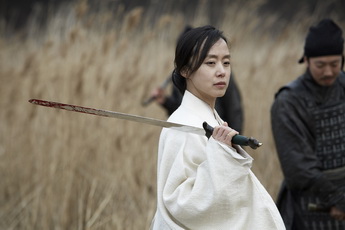 Prior to its release in August, Memories of the Sword had been one of the most highly anticipated Korean films of 2015, along with Veteran and Assassination. The pairing of Jeon and Lee, in a martial arts spectacle, no less, was enough to generate the gotta-see excitement among the viewing public. Even though writer-director Park Heung-sik (My Mother, the Mermaid, I Wish I Had a Wife) had never made an epic-scale period piece before, much less a wu-xia pian with lots of sword-play and wire action sequences, it was expected that, beyond technical difficulties, he would bring warm, humanistic touches to characterization and storytelling and reinvigorate well-worn clichés of the genre. Alas, the film was greeted with mixed reviews and, worse, rejected by the audience, selling a disappointing sum of 431,000 tickets nationwide, solidly beaten by even such medium-budget horror films as The Piper and Office in the box office.
Prior to its release in August, Memories of the Sword had been one of the most highly anticipated Korean films of 2015, along with Veteran and Assassination. The pairing of Jeon and Lee, in a martial arts spectacle, no less, was enough to generate the gotta-see excitement among the viewing public. Even though writer-director Park Heung-sik (My Mother, the Mermaid, I Wish I Had a Wife) had never made an epic-scale period piece before, much less a wu-xia pian with lots of sword-play and wire action sequences, it was expected that, beyond technical difficulties, he would bring warm, humanistic touches to characterization and storytelling and reinvigorate well-worn clichés of the genre. Alas, the film was greeted with mixed reviews and, worse, rejected by the audience, selling a disappointing sum of 431,000 tickets nationwide, solidly beaten by even such medium-budget horror films as The Piper and Office in the box office.
I really wanted to love this film: as a die-hard fan of Jeon, it was difficult to imagine a motion picture in which she plays a sword master could be in any way boring or listless. When I overheard that the grumbling that the film was "overly melodramatic," I was willing to give it a chunk of benefit of doubt: after all, was not the good heart caught between moral obligations on the one hand and undying sentiments of love on the other the hallmark of any decent martial arts epic? So what if a few tears are shed, even from the eyes of stoic warriors matched against their former romantic partners?
Ah, may Guan Yu's ghost have a big laugh at the expense of my naiveté, or more accurately, deficiency of imagination! Hardly could I have guessed that Memories of the Sword was nearly all tears shed from eyes of the warriors-- verily, I tell you, torrents of them-- awkwardly juxtaposed to the CGI-wrangled bits of "warrior action" stuff, utterly devoid of any excitement or urgency. It is a complete bust as a martial arts action film, and as a tear-jerking melodrama, it leaves a rather bad taste, as if we are being sold as a beautiful, tragic romance the story of a mind-shatteringly hateful divorced couple, who poisons the mind of their young daughter with unspeakable lies to ram her as a weapon against one another.
It is deeply ironical that when contemporary Korean filmmakers make supposedly realistic period pieces, they insist on turning them into deadeningly unimaginative reflections on the present-day politics (Joseon dynasty kings standing in for postwar Korean presidents, and so on), and yet when they produce out-and-out fantasies, they stick to the hoariest, most outdated motivations and value systems one could possibly derive from the "classical models." What point could Park Heung-sik have possibly wanted to drive home by making all of his personages so literal-minded about warrior codes, yet emotionally messed up? The only affective response they show upon learning some plot-mandated "truths (which you can guess from two miles away)" is to gnash their teeth and wail and cry (and boy, do they ever cry their eyeballs out). Why, I mean why, do the paying audience have to tolerate the fantasy characters many times more obdurate, unreasonable, self-righteous and depressingly morose than the authority and public figures they encounter in their real lives?
The screenplay by Park and frequent partner Choi A-leaum (Children of Heaven) is a mess: it fails in reining in various subplots and character elements and whipping them into a coherent, epic narrative. The complicated flashback structure is more confusing than enlightening: the film spends, for instance, way too much passage on Yu-baek's reminiscence of Wol-so, partly through associations sparked by the natural elements. These lyrical sections, beautifully photographed by DP Kim Byung-seo (Cold Eyes) and LS Sin Gyung-man (The Face Reader), evince bittersweet, elegiac quality at odds with the rigidly convention-bound narrative.
Jeon and Lee struggle mightily against the borderline psychotic characters they are saddled with, and talented veterans they are, manage not to embarrass themselves too much. Jeon is painfully stiff in her "present" role as Hong-yi's surrogate mother, but is totally believable in the flashback as an earthily beautiful tea farmer, generously reaching out to Yu-baek as an older sister would to a lost urchin. It was a mistake to film her action scenes in the "fluid," gliding-balletic style of Zhang Yi-mou (not a master of martial arts genre): it really constrains Jeon's natural buoyancy as an actress. Likewise, Lee can only do so much with a character so ruthless as to kill an infant and yet at the same time whose romantic yearnings we are meant to sympathize with. He cries a lot in this film too, to no avail. But the biggest casualty of the movie's incomprehensible characterizations is surely Kim Go-eun, who has become something of a Jennifer Lawrence figure in Korea after debuting to great acclaim in A Muse [Eun-gyo]. Kim's unadorned, unpretentious charm is, charitably speaking, wasted in a role that is no more than a puppet pulled hither and yon by her two egomaniacal "parents." I positively wanted to plug my ears every time Kim was forced to sing-song-recite her awful spunky-tomboy dialogue.
What salvages Memories of the Sword from being a total loss is its stunning production quality. Period pieces usually do a less than imaginative job of recreating the medieval Korea (as opposed to the post-15th century Joseon dynasty), but production design managed by Han A-reum (The Silenced), Kim Seung-gyeong (Masquerade) and the crew, and costume design by Jo Sang-gyeong (Assassination), abetted by the aforementioned superb cinematography by Kim and Sin, recreates a suitably subdued, lived-in yet attractively exotic (with a pinch of Middle Eastern flavor) environment for the characters. Even while your brain is benumbed by its content, the movie remains achingly gorgeous to look at.
It is definitely no help to kibitz now, but perhaps director Park should have either boldly "contemporized" his characters so that they act strictly according to modern (Korean) sensibilities, or, conversely, bowed down to the more "formal" elements of the wu xia pian genre, which means the characters expressing their purposes, motivations and emotions through exciting, well-designed fights (a la Crouching Tiger, Hidden Dragon [2000]), rather than through weeping, crying and shouting at one another. Trying to catch the goose that lays golden eggs and put the eggs in the basket, too, Park and co. merely succeeds in eviscerating their admittedly splendid-looking motion picture. (Kyu Hyun Kim)
Since the age of 18, Kim Won-jin (played by too many actors/actresses to mention) wakes up in a new body. This new body will have differences based on gender, race, and age, but never a different mind. (His internal voice stays male, as does his name, so I will use that pronoun here.) Although Won-jin will always understand Korean, sometimes Won-jin wakes up and finds he can only speak in another language. One day he speaks Japanese as a she, another day Czech back as a he. In one body he finds he can't speak. Won-jin keeps a vast closet filled with clothes of different sizes for these different bodies. He even maintains optometrist apparatuses to adjust the glasses/contacts necessary to address his daily changing eyesight. Only Won-jin's mother (Moon Sook, TV series Memory) and best friend (Lee Dong-hui, Cold Eyes, Veteran) know about his unique condition of bodily re-conditioning. Otherwise, Won-jin is completely alone, ironic since he wakes up physically as a different person everyday.
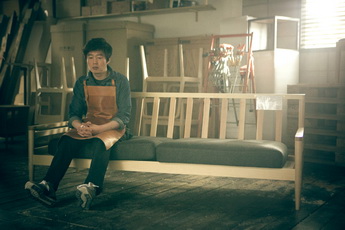 There are benefits to this predicament. When he wakes up as a smoking hot male, he can be free of the complications of a one-night stands since he will not look the same the next day, easily evading demands for more nights. He just needs to make sure he leaves before falling asleep and waking up as a 70 year old woman the next morning. Interestingly, the film does not pursue the possibilities of gender fluidity and polysexuality this narrative conceit provides. When his embodiment is a smoking hot woman, he doesn't pursue men or women. Won-jin only has sex with women as a man. (Even a montage of his multiple selves moving in to kiss stops at consummating a 'lesbian' kiss.) Even though there is precedent for such differently embodied permission for sexual ambiguity in a South Korean film, think Bungee Jumping of Their Own, debut director Baek Jong-Yeol chose not to go there. These alternative options are discarded through the inclusion of a scene when Won-jin is a gorgeous woman and he vehemently rejects his best friend's flirtations with the idea.
There are benefits to this predicament. When he wakes up as a smoking hot male, he can be free of the complications of a one-night stands since he will not look the same the next day, easily evading demands for more nights. He just needs to make sure he leaves before falling asleep and waking up as a 70 year old woman the next morning. Interestingly, the film does not pursue the possibilities of gender fluidity and polysexuality this narrative conceit provides. When his embodiment is a smoking hot woman, he doesn't pursue men or women. Won-jin only has sex with women as a man. (Even a montage of his multiple selves moving in to kiss stops at consummating a 'lesbian' kiss.) Even though there is precedent for such differently embodied permission for sexual ambiguity in a South Korean film, think Bungee Jumping of Their Own, debut director Baek Jong-Yeol chose not to go there. These alternative options are discarded through the inclusion of a scene when Won-jin is a gorgeous woman and he vehemently rejects his best friend's flirtations with the idea.
Back in the closet, Won-jin's elaborate closet, that is, Won-jin can afford all these clothes and expensive optometry equipment because he is a haute couture furniture designer, constructing chairs that are specific to the unique somatic dimensions of each sitter. As someone who continually has to adjust to a different body, this is a perfect niche for Won-jin. (Plus, it brings up another lost opportunity for The Beauty Inside. Outside of his one mute embodiment, Won-jin never wakes up in a body with a visible physical disability. The film could have ventured into a valuable side plot regarding the accessibility benefits of universal design in furniture and architecture.) When through his work Won-jin meets a beautiful furniture seller named Yi-Soo (Han Hyo-joo, Ad Lib Night, Cold Eyes), he ventures towards finally revealing his condition to someone outside of his mother and best friend. But first he needs to stay awake for a few days in order to maintain consistent embodiment.
(Interesting random side note about actress Han Hyo-joo concerning the missed opportunities in The Beauty Inside to explore physical disability, Han performed the audio description for the visually-impaired when the Japanese film My Back Page by Linda, Linda, Linda director Yamashita Nobuhiro was released in South Korea.)
The initial courting between Won-jin and Yi-soo is a lovely example of parties exploiting their 'cultural capital', a term brought to us by public intellectual Pierre Bourdieu to describe the non-financial assets, such as culturally-valued knowledge, that enable social mobility outside of economic means, to woo ones romantic interest. Won-jin and Yi-soo both display their knowledge of furniture design to position themselves socially as refined, cultured individuals worthy of each other. They are as perfectly matched as the haute couture chairs to the unique as snowflakes butts of Won-jin's customers. Their preference for sushi serves this purpose of cultural capital too. In addition, we the audience get to revel in the gorgeous designs that most of us could never afford. We can imagine what it would be like to be of the class that has the dispensable cash and living space to acquire all the delightful props on display.
The aesthetically pleasing furniture serves another purpose, a purpose similar to the mainstream-film-demanded attractiveness of Yi-soo and many of the Won-jins. (Although my favorite Won-jin is typecast-as-unattractive character actor Kim Sang-ho.) This gorgeous furniture belies the title of the film. (The Korean title is the hangulification of the English title sans the 'The'.) The title and the plot might encourage us to see the 'beauty inside', but a great deal is invested in the beauty outside to get us to believe the love between Yi-soo and Won-jin. The Beauty Inside meets the requirements of a decent mainstream romantic comedy providing couples with that coveted dinner and a movie option. Its use of so many Won-jin's presented a challenge that director Baek handles fairly well, resulting in his receiving the 2015 Best New Director award at the Daejong Film Awards. But an unwillingness to delve into polysexuality and physical disability (and therefore provide roles for actors and actresses with disabilities) results in a film that failed to pursue greater cinematic potential, let alone human potential. (Adam Hartzell)
Mi-rye (Ko Ah-sung, Snowpiercer) is an intern at the sales section of a powerful food and drink company. She, like her office-mates, the live-wired Assistant Manager Hong (Ryoo Hyun-kyung, Manshin: Ten Thousand Spirits), the craven Chief Kim (Kim Eui-sung, Hill of Freedom), the sexy tart Ha-young (Lee Chae-eun, Tabloid Truths), the macho Jae-il (Oh Dae-hwan, Blind) and the hunky Won-seok (Park Jeong-min, Bleak Night), are stunned to learn that the perennially overworked Manager Kim Byung-gook (Bae Sung-woo, Veteran), a man who proverbially "could not harm a fly," massacred his entire family, including his nine-year-old disabled son, with a hammer, and disappeared. To the major case detective Jong-hoon (Park Seong-woong, Horror Stories 2), they all claim total ignorance as to the whys and wherefores of Manager Kim's rampage: except for Mi-rye, who has been a witness to inter-official affairs that others would rather not divulge to the police. Soon it is discovered that Manager Kim is recorded in the CCTV footage as entering the parking garage of the company but never coming out, and weird and terrifying things begin to happen to the section members.
 Office, directed by Hong Won-chan, the rookie director previously known as one of the screenwriters for Na Hong-jin's The Chaser (2007) and The Yellow Sea (2010), follows in the footsteps of strikingly modernist, psychologically complex, urban horror films of early 2000s Korea, especially The Uninvited (2003) and Into the Mirror (2003). Hong dips his toes gingerly in the supernatural territory and stages a few impressively bloody set pieces-- including one death by stabbing seemingly referencing Dario Argento's Bird with the Crystal Plumage (1969)--but the bulk of his attention is paid to cool observation of the mental breakdown of its characters. All personages, including the sympathetic protagonist Mi-rye and the intelligent cop Jong-hoon, are guilty of moral compromises, and suffer from the inability to precisely understand the meaning of what they have visually witnessed (one of the recurring leitmotifs of the Italian gialli).
Office, directed by Hong Won-chan, the rookie director previously known as one of the screenwriters for Na Hong-jin's The Chaser (2007) and The Yellow Sea (2010), follows in the footsteps of strikingly modernist, psychologically complex, urban horror films of early 2000s Korea, especially The Uninvited (2003) and Into the Mirror (2003). Hong dips his toes gingerly in the supernatural territory and stages a few impressively bloody set pieces-- including one death by stabbing seemingly referencing Dario Argento's Bird with the Crystal Plumage (1969)--but the bulk of his attention is paid to cool observation of the mental breakdown of its characters. All personages, including the sympathetic protagonist Mi-rye and the intelligent cop Jong-hoon, are guilty of moral compromises, and suffer from the inability to precisely understand the meaning of what they have visually witnessed (one of the recurring leitmotifs of the Italian gialli).
The film will prove disappointing to those who want a perfectly logical solution to the mystery of whodunit, and its chilly emotional temperature (and refusal to provide an easily condemnable villain) might turn off some viewers expecting a more melodramatic unspooling of the narrative. On the other hand, Office is presented with a remarkably eye-catching visual scheme (see, for instance, the use of a projector's green light during a sales report conference, or the distinctive ways the commuter trains and Han River bridges are filmed every time they show up on screen), supervised by DP Park Yong-su (Haemoo) and Lighting Director Choi Cheol-soo (Boomerang Family). Art Directors Sin Yoo-jin and Jeong Eun-gyo are entrusted with the task of keeping the office space familiar and mundane yet subtly menacing and oppressive. Equally deserving of mention is Kim Tae-sung, An So-young and Jeong Ji-hoon's music that crosses over and back between nerve-tingling sound design and pulsing electronic drones, suggesting sonic ambience of a submarine diving into the stygian depth.
Hong also scores in terms of creative casting and wrangling actors. Park Seong-woong, Ryoo Hyun-kyung and Bae Sung-woo are all familiar character thespians but cast against their conventional images. Jong-hoon, for instance, is unusually professional and reasonable for a South Korean police officer and Park's slightly chilly and academic demeanor fit such characterization perfectly.
In the end, however, the film belongs to Ko Ah-sung. She delivers a remarkably seasoned, carefully calibrated performance as a shrinking violet torn between playing by the rules of the electric-wire jungle and standing up for the uncomfortable truth. Ko is so good that I find it ultimately disappointing that Hong and screenwriter Choi Yoon-jin (Steel Cold Winter) neglected to give the viewers a chance to directly peek into her state of mind, especially in relation to Mi-rye's pretty and well-educated competitor Da-mi (Son Soo-hyun, Mad Sad Bad), whose role could have been expanded to catalyze Mi-rye's coming to terms with her own subjectivity. As the final image of a phone call received at a subway station fades into black, we are not sure if Mi-rye has actually learned anything from her tribulation. Sophisticated ambiguity, I am afraid, undercuts the message in this case.
These caveats notwithstanding, Office is a taut, well-made psychological horror film and an excellent showcase for the talents of its strong cast, especially former teen star Ko Ah-sung. (Kyu Hyun Kim)
The movie opens with Joon-sik (Jo Han-seon, Cruel Winter Blues) rushing to the hospital only to discover that his wife So-yeon (TV actress Kim Min-kyung) had gone through a traumatic miscarriage. Two years later, their marriage is on the rocks, despite good intentions on both sides. One day, So-yeon proposes a trip to an isolated island as a diversion and Joon-sik reluctantly accepts. After expected driving and cell-phone problems, the annoyed couple reaches what appears to be a run-down, country chicken soup restaurant, run by the burly Seong-cheol (Ma Dong-seok, Kundo: Age of the Rampant, The Royal Tailor) and his alarmingly sexy female companion Min-hee (Ji-an, 48m). Even though disturbed by the verbal and physical violence heaped on Min-hee by Seong-cheol, the urbanite couple gradually falls under the spell of the ogre-like restauranteur, who wines and dines them with such delicacies as pickled-centipede soju and a freshly dressed and boiled chicken. When Joon-sik's guard is sufficiently down, Seong-cheol drops the bombsell: he will offer Min-hee's sexual service as a sign of hospitality to the younger salaryman. And the latter had better accept it in good faith. Can the couple escape the ant-lion's pit before it is too late?
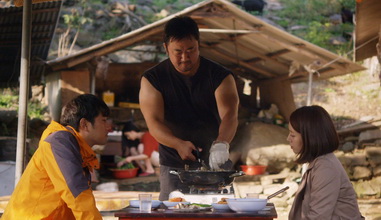 Deep Trap is a contemporary Korean variant of the "out-of-element urbanites trapped in a rural hellhole" sub-genre of horror films. Director Kwon Hyung-jin (For Horowitz, Wedding Dress) has previously directed Truck (2007), a fitfully engaging thriller ultimately brought down by its preposterous premise and totally unnecessary detour into pop psychoanalyzing. Thankfully, Deep Trap is a whole lot more interesting than Truck, although its psycho-killer-is-after-us thrills are still rather generic, even if competently put together. For this film, Kwon and screenwriter Han Soo-bong tightly focus on the married couple's emotional state, and, to a certain extent, sexual tensions that develop among them, the villain and his mate. The film is reminiscent of the '70s American "hillbilly" thrillers in its evocation of the atmosphere of rural decay and sensual abandon, with the underlying glee of breaking bourgeois taboos, even more so than contemporary American horror films that try to get at these qualities. Sex scenes have unexpected, musky urgency that is both titillating and uncomfortable, culminating in a very painful rape sequence that might prove too much for some viewers.
Deep Trap is a contemporary Korean variant of the "out-of-element urbanites trapped in a rural hellhole" sub-genre of horror films. Director Kwon Hyung-jin (For Horowitz, Wedding Dress) has previously directed Truck (2007), a fitfully engaging thriller ultimately brought down by its preposterous premise and totally unnecessary detour into pop psychoanalyzing. Thankfully, Deep Trap is a whole lot more interesting than Truck, although its psycho-killer-is-after-us thrills are still rather generic, even if competently put together. For this film, Kwon and screenwriter Han Soo-bong tightly focus on the married couple's emotional state, and, to a certain extent, sexual tensions that develop among them, the villain and his mate. The film is reminiscent of the '70s American "hillbilly" thrillers in its evocation of the atmosphere of rural decay and sensual abandon, with the underlying glee of breaking bourgeois taboos, even more so than contemporary American horror films that try to get at these qualities. Sex scenes have unexpected, musky urgency that is both titillating and uncomfortable, culminating in a very painful rape sequence that might prove too much for some viewers.
It is also possible that some viewers (especially Euro-American ones) might feel that a certain behavior of So-yeon's that sets the whole ordeal in motion is unbelievably "male-centered," but this set-up is well within the realm of not only the possible but also the probable in the contemporary South Korean society, just as the case of hideous exploitation of Bok-nam as a wife-slave in Bedevilled (2010) could have been culled from a real-life documentary. In my view, Kwon and Han actually deserve praise for keeping Joon-sik a decent guy without essentially emasculating his character, while acknowledging his flaws and weaknesses (such as his semi-alcoholic status). Suffice to say that Deep Trap is not about a city pencilneck discovering his "wild side" after being cornered by a psycho killer in an isolated wood cabin.
Jo Han-seon and Kim Min-kyung are good as the city couple, but the film's main strength is Ma Dong-seok's charismatic presence as the psychotic restauranteur. Ma has become a familiar face in recent Korean genre cinema playing super-macho guys who can also play cute and charming. Here he is given a chance to strut his stuff as an irredeemably despicable character. Yet, Ma stays away from the usual eye-rolling "psychotic" performance given in a Korean film-- Choi Min-shik in I Saw the Devil (2010) comes to mind-- and mounts a sly, restrained portrayal. There are glints of reptilian intelligence in his eyes, as gruff threats and surprisingly silky-voiced cajoling pour out of his mouth. It is too bad that Deep Trap lacks a sequence or two in which Seong-cheol is allowed to confront other characters showing off his evil cunning, or conversely, displaying character flaws that ultimately prove his undoing. I think Ma could have just run off to a touchdown with a sequence like that.
Deep Trap ultimately does not rise above the level of a conventional thriller, but is otherwise a decent nail-biter graced with good to excellent performances, and is recommended to fans of the genre. I hope it gives much-deserved exposure outside Korea to Ma Dong-seok, who has a B.A. in Physical Education (!) from Columbus State University and is apparently capable of working in English. (Kyu Hyun Kim)
Look at that! ![]() is trending on Twitter!
is trending on Twitter!
Ohhhhhhh. . .
Just as Hong Sangsoo's Right Now, Wrong Then (RNWT) tells a story twice, my telling of my theater time w/ RNWT is a tale of two filters, seeing it first with past Hong films to guide me, and then seeing it again with the additional intrusion of the tabloid torrent following revelations of Hong's extramarital affair with the lead actress Kim Min-hee (Helpless, The Handmaiden). Should this 'scandal' intrude our discussion of the film? Or should we jettison the personal lives of these professionals and simply immerse ourselves in the fictional text?
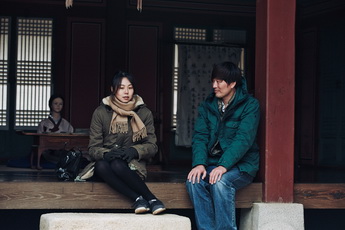 Let me begin by simply summarizing the plot. Chun-soo (Jung Jae-young, Castaway on the Moon, Our Sunhi) is our director who finds himself in Suwon a day earlier than his film screening at a university. Falling asleep while visiting a historical landmark, Chun-soo awakens to meet Hee-jung (Kim Min-hee) drinking banana milk. He strikes up a conversation and spends the rest of the day with Hee-jung, going to her art studio, a sushi restaurant, and to a gathering of older friends. We end each section with Chun-soo attending the Q&A of his film.
Let me begin by simply summarizing the plot. Chun-soo (Jung Jae-young, Castaway on the Moon, Our Sunhi) is our director who finds himself in Suwon a day earlier than his film screening at a university. Falling asleep while visiting a historical landmark, Chun-soo awakens to meet Hee-jung (Kim Min-hee) drinking banana milk. He strikes up a conversation and spends the rest of the day with Hee-jung, going to her art studio, a sushi restaurant, and to a gathering of older friends. We end each section with Chun-soo attending the Q&A of his film.
Do not rinse, but do repeat. Do not rinse the remains of the first part away from the second part because the arc of the first part conditions the roots of the second part. Chun-soo's romantic intension towards Hee-jung is obstructed in the first part, but come the second time around, he prevails. The first section has romance ruined by the late revelation of Chun-soo's marital status; whereas, the second act divulges this information earlier, making it less disruptive. The first part has Chun-soo's marital status revealed by Hee-jung's older female friends. The second part has Chun-soo confessing on his own inebriated accord. The slight contempt towards Chun-soo held by Hee-jung's friends in the first part is replaced with adulation in the second. That is until, well, let's keep the spoiler's clothes on and not reveal too much here, shall we? Each of these instances in the second part is impacted by what we witnessed earlier the first time around.
This double-vision of similar scenes had me recalling the silent-movie-esque title cards in Turning Gate. Those title cards told you a summary of what was going to happen in the following sequence. When asked about these title cards during a Q&A I attended, Hong basically said his intent was for you to watch for the 'how' rather than the 'what'. I have found this direction of the audience a rewarding way to watch a Hong film. And while watching RNWT, I began to think of the first half as one big title card for the second half. The first half is the what for the second half how.
The example that most intrigues me of how the first telling can influence the second involves the interactions between Chun-soo and Bo-ra (Ko Ah-sung, The Host, Snowpiercer). Although Chun-soo's inner voice is heard telling him to resist his attraction for Bo-ra in the first half, we do not hear anything in the second half. But what we heard in the first half influences our reception of the second half. The first viewing suggests the existence of a resistant inner voice in the second part as we look-up at Chun-soo looking down. By juxtaposing this collection of revisited scenes, Hong wrenches out of us reactions that would have perhaps never arisen were we to only see just one of these tellings. I find myself more anxious than usual for the eventual DVD release so I can re-order the two parts, watching the second part first to see what different impact such a flip might have on my responses to the first part as second.
As I noted above, my second theater helping had me re-visiting RNWT with the real life news. I must admit I had slightly different reactions to Chun-soo's infidelity re-plays the second time around. I was now closer to playing the accusatory role of Hee-jung's earlier older female friends, more contemplatively contemptuous of adulterous Chun-soo than I was during the first screening. I'm not a 'film-diegesis' purist. I am as intrigued by how the outside-the-film world impacts one's experience with a film as I am the film as an enclosed space. Plus, Hong's films are self-intersectional, his films are 'ouevrely-embedded' in the plots, dialogues and settings of his other films through the repetition of similar themes, characters and actresses/actors. One repetition revelation I had this time is how often veteran actress Yoon Yeo-jung (HaHaHa, In Another Country) is utilized to reel back female love-interests from the grasps of Hong's main men, which she does in RNWT as Hee-jung's mother who is the sheriff of the panopticon that is Hee-jung's home on the hill. Only ones first Hong film can be watched free from the influence of the others.
And now some might be finding gossip influencing interpretations of RNWT since the tabloids claim Hong's wife was tipped to the affair. (I have been unable to confirm Hong's wife's name, leaving me to refer to her via her relationship to him, something I'd prefer not to do.) Regardless of the truth to this gossip, I am still hesitant to argue that Hong's films represent 'real life', even if they may resonate with things we've heard or read about Hong. Hong's films are philosophical treaties, questioning conceptions of language and relationships (of all kinds, not just romantic), all while disrupting our sense of time and our logical connections between scenes. I leave Hong's films disoriented by the confusion of attempting to impose a logic on what I just saw. As writer Kate Oh tweeted, "A profoundly good book or movie leaves you feeling empty [because] it has expanded your scope of experience." You then grow into that new space." Hong's films grow within me for extended gestation periods beyond my initial viewing, everlasting evergreen.
It is important to underscore that Hong's extra-marital affair is a separate affair from the affairs on screen. And we should not make false comparisons with other directors who have committed illegal acts or been accused of such. Hong has done nothing illegal here. (Yet it's a good thing this happened after February 2015. Up until then, infidelity was indeed illegal in South Korea. Before South Korea's equivalent to the Supreme Court struck that law down, a husband or wife could take their wayward partner to court and if convicted, their partner could go to jail.) But this real-life extramarital affair does reveal a lacunae in the majority of Hong's films.
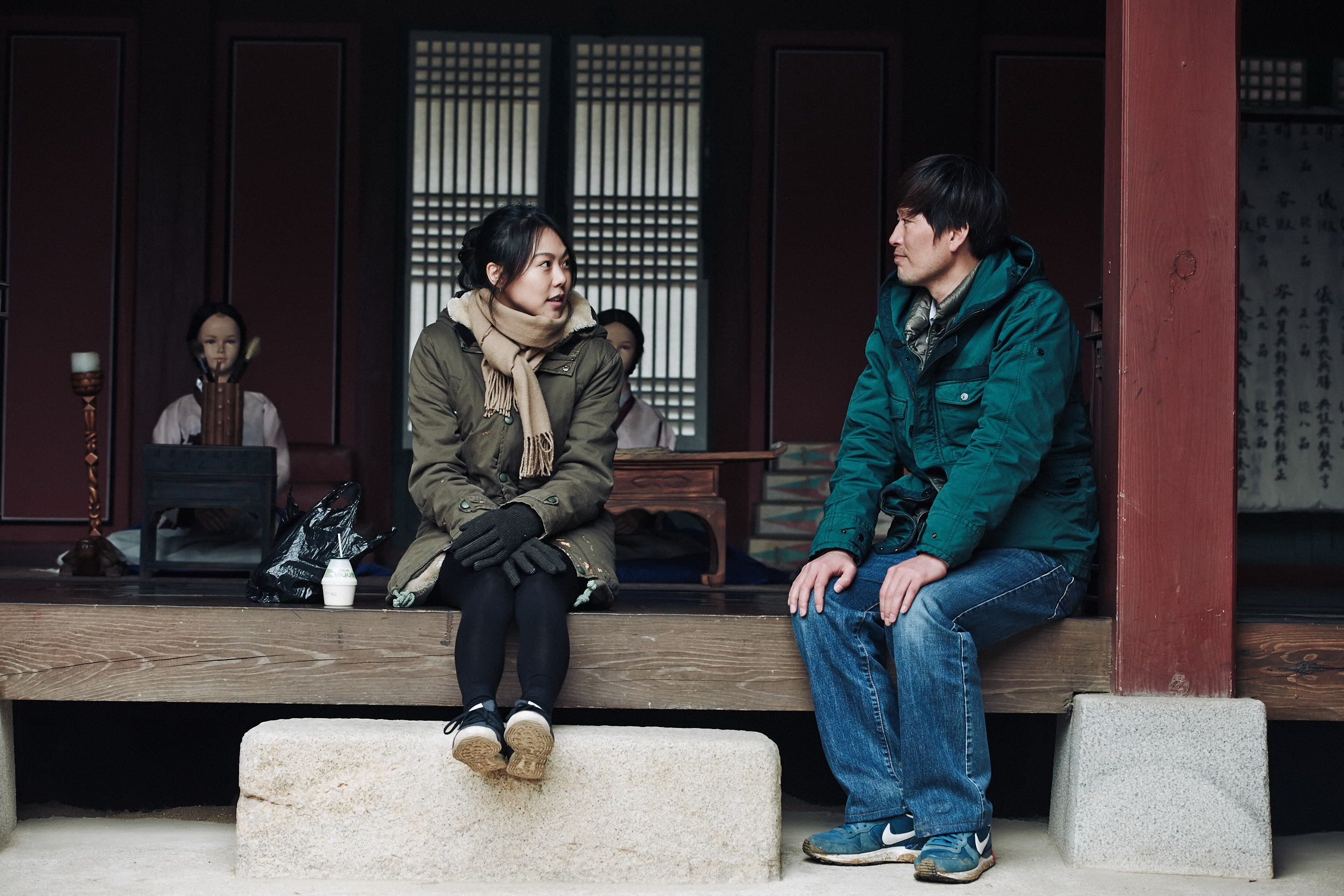 In the wake of this gossip, I found myself wondering, has Hong devoted considerable screen time to the married party outside the dyad that is required to make an extra-marital affair extra? That is, does the non-cheating partner ever take center stage? In Hong's debut, The Day a Pig Fell Into the Well, the husband whose wife is cheating on him hires a prostitute, so he's cheating too. There are glimpses of the cheated-on party in The Power of Kangwon Province, but her story is not one that we follow. Sun-young's husband isn't a significant story in Turning Gate either. Plus, whether or not he is really cheating along w/ being cheated on is not absolutely clear. Gyung-soo could just as likely being making that gossip up like he bullshited about looking at the poster in the restaurant instead of the young woman's legs. Surveying my Hongian homunculus, I find the spouses who are being cheated on are primarily allusions, only once an intrusion.
In the wake of this gossip, I found myself wondering, has Hong devoted considerable screen time to the married party outside the dyad that is required to make an extra-marital affair extra? That is, does the non-cheating partner ever take center stage? In Hong's debut, The Day a Pig Fell Into the Well, the husband whose wife is cheating on him hires a prostitute, so he's cheating too. There are glimpses of the cheated-on party in The Power of Kangwon Province, but her story is not one that we follow. Sun-young's husband isn't a significant story in Turning Gate either. Plus, whether or not he is really cheating along w/ being cheated on is not absolutely clear. Gyung-soo could just as likely being making that gossip up like he bullshited about looking at the poster in the restaurant instead of the young woman's legs. Surveying my Hongian homunculus, I find the spouses who are being cheated on are primarily allusions, only once an intrusion.
That single intrusion is pregnant Geum-hee, Moon So-ri's character in In Another Country. But still, her husband is trying to cheat on her and Anne, Isabelle Huppert's character, isn't interested in even kissing Jong-soo again. In all of Hong's films with so much attention paid to relationships and the limitations of language, the married party who is being cheated on, the subaltern, the 'subaffair' so to speak, only gets to speak once.
Hong's films are neither morality tales nor reality tales. But they also aren't void of the complications of real life. Hong's films are tough. They are discomforting because of the arguments and awkwardness that erupts, but also because Hong is not providing us the genre tropes or logical narratives we rely on for cohesion. As Darcy puts it in his interview with Hong for Issue 0 of Nang magazine, Hong's narratives "... hang on intricately layered structures, and are marked by fascinating patterns and repetitions of visual and narrative details." In addition to their confounding complexity, Hong's films often make us laugh, but they are equally full of unpleasantries. Some scenes, like the competing male-gazes in the Chinese restaurant of Woman Is the Future of Man, are downright creepy.
As a result, I don't leave Hong's films feeling good. I leave feeling unstable, forced to re-form as I take leave of them. I might find pleasure in ruminating about his films, in putting the disjointed pieces together again, but I doubt whether Hong prioritizes our pleasure when making his films. As Director Ku says in Like You Know It All, "No clear messages, ambiguous at best." And it is ambiguity, rather than certainty, where relationships get real.
We can choose to ignore the tabloids and gossip websites when talking about Hong's films. I, for one, do not find myself motivated to look for evidence of Hong's real life dalliance. Yet the gossip does have me noticing holes in his texts. The subaffair's voice, their presence, has gone missing for the most part. Hong is a master of awkward, discomforting scenes and dialogue about the folly of philandering men and the women such men pursue, but how awkward that perhaps the most discomforting of characters is rarely confronted. (Adam Hartzell)
Jang-woo (the musical actor Joo Won, TV dramas Bread, Love and Dreams and Bridal Mask) works at an ice factory in a small Southeastern coastal town. Struggling to make do with a perky younger sister Eun-ji (Ryoo Hye-young, Ingtoogi) as his charge, he decides to sell his parent's property and relocate to Seoul with her. Tragically, Eun-ji is viciously rape-murdered one night. However, a strange incident during a shamanistic ritual leads him to believe that a local teenage psychic Si-eun (Lee Yoo-young, The Treacherous) holds a clue to the identity of the killer. And the latter is about to commit another rape-murder.
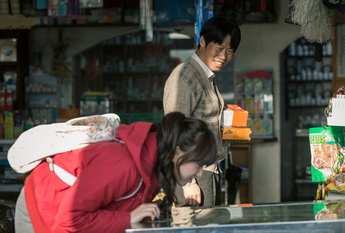 Allegedly based on a real-life experience of the writer-director Yun Joon-hyung (director of the cult found-footage horror film Mokdugi Video [2003])-- the family of a murder victim in an unresolved case came to be convinced that a man "pointed out" by the dead spirit during a shamanistic ritual was the real murderer, yet they could not produce any proof--, Fatal Intuition is neither a proper who-dun-it mystery nor a socially conscious, satirical thriller in the mold of Bong Joon Ho's Memories of Murder. It is in essence a psychological horror film that uses the murder-mystery plot as a chassis onto which profoundly unnerving and realistically ugly depictions of the evils of a small-town Korea could be hung.
Allegedly based on a real-life experience of the writer-director Yun Joon-hyung (director of the cult found-footage horror film Mokdugi Video [2003])-- the family of a murder victim in an unresolved case came to be convinced that a man "pointed out" by the dead spirit during a shamanistic ritual was the real murderer, yet they could not produce any proof--, Fatal Intuition is neither a proper who-dun-it mystery nor a socially conscious, satirical thriller in the mold of Bong Joon Ho's Memories of Murder. It is in essence a psychological horror film that uses the murder-mystery plot as a chassis onto which profoundly unnerving and realistically ugly depictions of the evils of a small-town Korea could be hung.
Yun is at his best when he smokes out sensations of something-is-not-quite-right uneasiness or the atmosphere of soul-crunching patriarchal repression, out of the paradoxically cluttered desolation and colorful decrepitude of the diegetic environment. This oppressive yet neon-hued ambience is the film's chief arsenal and ends up far more effective in conferring the film a consistent tone of dread and desperation than its overcooked screenplay by Yun and Kim Young-gap (A Cruel Attendance). The writers try hard to weave together various thriller motifs into a tautly stretched narrative, but are successful only part of the time. Frustratingly, even though some of the twists and turns make sense only when the viewer accepts the overt presence of the supernatural, Yun seems reluctant to fully acknowledge the latter.
Aside from the police captain, a snarky and incompetent jackass (Seo Hyun-woo), and Eun-ji, all major characters in Fatal Intuition are obsessives of one kind or another. Although Joo Won does a good job exuding grief, determination and rage as the avenging brother Jang-woo, his character is such a macho cretin (his attitude toward his sister is rather insufferable, if not creepy) that I found myself unable to sympathize with his more doltish actions. Si-eun is an interesting "psychic" character, reminiscent of "spiritually sensitive" female victims in the Dario Argento gialli, but aside from her intriguing visions, she is essentially a shrinking wallflower, certainly no one's idea of a feminist heroine.
This leaves Yoo Hae-jin (Veteran, Tazza: The Hidden Card), the superb character actor, to dominate the movie as one of the more interesting Korean cinematic villains in recent memory. Usually known for boisterous comic relief characters, Yoo here brings quiet, restrained menace to the role of the pharmacist Min, the prime suspect in the eyes of Jang-woo. Ironically, he looks and talks so "normal" amidst the slightly crazy-obsessed or eyes-downcast-harried behavior of the townies that the viewers in fact begin to find him psychologically "off." Yoo easily makes his calm confrontation with Joo Won in the police station the film's most shocking and best-acted scene, by expertly playing off Joo's explosive rage.
Production values are good to excellent. Yang Hong-sam (Mr. Go)'s production design and Ji Hyun-seo (Scarlet Innocence)'s art direction endow the film's settings (such as the weirdly jerry-rigged laundromat lined with menacingly vibrating, blunt-headed washing machines, where Jang-woo discovers her sister's body to his abject horror, and the uber-creepy abandoned mansion in which the tense climax takes place) with believably despondent yet slightly surrealistic qualities. DP Lee Jae-hyuk (long-standing Lighting Supervisor for many films) and LS Kim Hee-tae (When Winter Screams) complement their efforts through darkly luminous gel lightings again reminiscent of the '70s and '80s European horror.
Fatal Intuition is not entirely satisfactory as a mystery thriller, but is worth watching for its unusually powerful atmosphere of dread and desperation, the smoke machine being partly fueled by perpetual-motion dynamics of the Southeastern Korea's zombified patriarchal ideology, and Yoo Hae-jin's thoughtful performance, an outstanding example of how not to play a typical movie psycho. (Kyu Hyun Kim)
A group of Caucasian priests are frantically driving through the nighttime Seoul. One of them is holding onto what appears to be a small, squealing animal wrapped up in a black cloth. Next thing, their car is overturned in a terrible crash. Whatever was hidden under the cloth now possesses a young high school girl caught up in the accident, Young-sin (Park So-dam, The Silenced). The Vatican urgently reaches out to the Korean Catholic church, and the open disdain of the ecclesiastical leadership notwithstanding, the chain-smoking, unkempt Priest Kim (Kim Yun-seok, Haemoo) is selected to handle this problem. When Priest Kim's old partner refuses to work with him again, the church sends a novice deacon Choi (Kang Dong-won, Kundo: Age of the Rampant) as a replacement. Choi is stunned to learn that his duty is to assist Priest Kim in performing a ritual of exorcism over Young-sin. Moreover, the church's high echelons are suspicious that Priest Kim might have been sexually inappropriate with the allegedly bewitched girl and has clandestinely tasked him to procure an evidence of the older priest's misconduct.
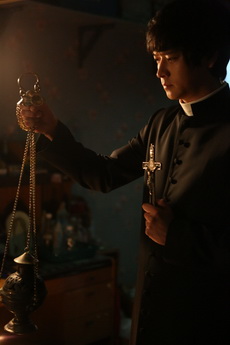 The Exorcist (1973) may hold the record as the Hollywood blockbuster that has generated the largest number of cheapskate knock-offs. Many, perhaps most, of the Exorcist rip-offs are horrendously sleazy affairs in which nubile young actresses are subject to many forms of cinematic degradation, uttering ridiculously "foul" dialogue and spewing forth a wide range of stupid crap, including live frogs (!). Yet, regardless of the seeming global decline of old-fashioned beliefs in the Old Scratch, movies involving demonic possession and exorcism continue to proliferate. Very occasionally we get to see some witty variations on this theme, such as The Last Exorcism (2010) that self-consciously satirizes evangelical Christian approach to the supernatural, or The Possession (2012), in which the object of the possession by a Hebrew demon is rendered unusually sympathetic.
The Exorcist (1973) may hold the record as the Hollywood blockbuster that has generated the largest number of cheapskate knock-offs. Many, perhaps most, of the Exorcist rip-offs are horrendously sleazy affairs in which nubile young actresses are subject to many forms of cinematic degradation, uttering ridiculously "foul" dialogue and spewing forth a wide range of stupid crap, including live frogs (!). Yet, regardless of the seeming global decline of old-fashioned beliefs in the Old Scratch, movies involving demonic possession and exorcism continue to proliferate. Very occasionally we get to see some witty variations on this theme, such as The Last Exorcism (2010) that self-consciously satirizes evangelical Christian approach to the supernatural, or The Possession (2012), in which the object of the possession by a Hebrew demon is rendered unusually sympathetic.
First thing that I must point out at the outset is that The Priests is a totally straightforward Catholic horror film: it is neither a black comedy nor a political critique disguised as a genre film, and although I do not know whether writer-director Jang Jae-hyun is a practicing Catholic, his film takes the theological problems germane to Catholicism raised throughout the film absolutely seriously. Depending on what your cultural/religious stance is, this could be a good thing or a bad thing (for me, it is a definite plus). As it turned out, The Priests blasted through the Korean box office in the fourth quarter season of 2015, ultimately selling 5.4 million tickets to easily slip into the year's ten biggest box office hit list, although the imagery of Kang Dong-won decked out in cassock doubtlessly contributed greatly to the movie's massive popularity among the female demographic (Keanu Reeves, eat your heart out).
Director Jang, for whom The Priests is a debut feature, proves himself to be an impressive screenwriter, reining in gore or excessive dramatics and emphasizing character development (centered on Choi's guilty conscience involving his sister's death). His direction does display some rough edges, as in the cringe-worthy "comic" montage through which we see elder priests zeroing on Choi as the aid to Priest Kim. On the positive side, he keeps the narrative run reasonably tightly, endowing the set-pieces with believable details (this is probably the first exorcism movie I have seen in which the priest-heroes actually sing hymns during the demon-scuttling ritual). I wish he had the fortitude to have included more slyly humorous scenes like one in which the demon possessing Young-sin electrocutes a Walkman playing Victimae Paschali Laudes, grumbling "Damn that Bach!"
As is the case with most recent Korean genre films, the greatest strength of The Priests is the energetic performances given by its main cast. Despite his androgynous beauty, Kang Dong-won solidly anchors the film's preposterous-to-non-believers premise to the ground, striking the right balance between earnest heroics and cute befuddlement. Likewise, Kim Yun-seok is reliably taciturn and intense, although from my (Catholic-prejudiced) viewpoint, his Priest Kim seems to be deficient in the kind of spiritual gravitas that I tend to associate with the real-life clergy "fighting in the trenches." However, the film's biggest acting contribution is perhaps made by Park So-dam as Young-sin: she is genuinely frightening and mesmerizing as many demons deriding, rebuffing and cursing the priest's attempts in multiple languages.
Not as challengingly genre-bending and artistically ambitious as, say, Park Chan-wook's Thirst (2009), The Priests is nonetheless a superior example of a religious horror film, and is highly recommended to those capable of appreciating such films. (Kyu Hyun Kim)
There was a cavernous crevice I needed to get over while watching Lee Suk-Hoon's The Himalayas. It is hard for me to understand the moments in the film where climbers would expect strangers at base camp to save them from the danger they put themselves in. Mountaineers aren't seafarers where it is part of their job to deliver goods across treacherous waters. Climbers choose this danger. If other climbers have the good sense to wait things out at base camp, why should those at base camp be expected to risk their lives by going into conditions they knew they shouldn't?
 But when I began to reflect on The Himalayas as a sports film, it began to make sense. This is not to say I agreed with the logic. It simply began to make its own sense. I could see the internal logic. There appears to be a code among these climbers that when they run into danger, fellow climbers will help them. The comradeship that develops between fellow climbers in an expedition can be extended to other groups of climbers where fidelity fuels a willingness to rescue a fellow climber in need. This is alluded to early in The Himalayas where Um Hong-gil rushes to save stranded climbers at the beginning of the film. When climbers plead for assistance when in danger, they are pleading for the group collective of the climber code to help them out of the bind they've climbed into.
But when I began to reflect on The Himalayas as a sports film, it began to make sense. This is not to say I agreed with the logic. It simply began to make its own sense. I could see the internal logic. There appears to be a code among these climbers that when they run into danger, fellow climbers will help them. The comradeship that develops between fellow climbers in an expedition can be extended to other groups of climbers where fidelity fuels a willingness to rescue a fellow climber in need. This is alluded to early in The Himalayas where Um Hong-gil rushes to save stranded climbers at the beginning of the film. When climbers plead for assistance when in danger, they are pleading for the group collective of the climber code to help them out of the bind they've climbed into.
Yet there also appears to be an understanding within this code that some climbs are too dangerous. The climbers outside the group who decline to ascend an aspiring rescue are still respected by the climbers pleading for help. It is not a given that other climbers will come to your rescue regardless of conditions. You are not entitled to a rescue. And the climbers in danger in The Himalayas seem to understand this. When the old crew needs to be brought back together by Hong-gil, the personal reasons for each member's hesitation is respected by Hong-gil. They are not painted as selfish. In these scenes, there are no Manichean mainstream moments of lazy character building. Hong-gil sees the complexity, the difficulty, in the choice to climb again. Family obligations are appreciated, not denigrated. Hong-gil refuses to guilt-trip anyone into participating one last time. Entering the void is a choice. It should not be forced.
The Himalayas took a light saber to Star Wars: The Force Awakens in South Korea. (Interestingly, it wasn't the only South Korean film where the force was strong. A local remake of Miss Granny, Em La Ba Noi Cua Anh/Sweet Twenty, beat Star Wars: TFA as well in Vietnam.) The film is based on the true story of mountaineer Um Hong-gil, the first person to reach the summit of the 16 highest peaks. Part of The Himalayas indigenous success is likely due to national pride in Um's amazing accomplishment, but we cannot downplay the fact that Um is played by the Mount Everest of South Korean actors, Hwang Jeong-min (Veteran, YMCA Baseball Team). Hwang is a joy to accompany along this film's climb. Hwang builds a Hong-gil of depth, not caricature. As for other actors of note, I'm partial to Jeong Yu-mi because she's in so many Hong Sangsoo films (Oki's Movie, Our Sunhi), but she is a true delight to watch in this even if you don't share my bias. The presence of these two helped motivated me to join this film expedition.
One thing non-native speakers will miss in The Himalayas is the Daegu accent that Jeong, Jung Woo, and Kim In-kwon's characters speak. Equally local, but apparent to anyone who has visited Seoul or Busan, are the nice parallels of mountains with the massive flights of stairs one sees throughout these cities. My favorite scene in the film is when the character Jo Myung-ae (Ra Mi-ran, Dance Town, Ode To My Father) calls Hong-gil out on his sexism. Um's response is not to be defensive but absorb the feedback and truly apologize. He doesn't explain it away. He accepts responsibility for failing her. It is a moment of the new man disrupting the remasculinization of New Korean Cinema, realizing the ascent of his sisters is just as important as that of his brothers.
But there are problems that limit this film's impact. We seem to speedily dash through the snow of emotional drifts through most of the film. Mountain-climbing as cinematic metaphor seems more fitting to casually-paced contemplative scenes over quick cuts. Yet slow cinema is anathema to mainstream cinema. Even the perfectly cinematic moments of mountain vistas, looking at and from mountains, moments where we could linger and allow emotions to seep in like the freezing cold, even these scenes seem fleeting. We don't get to savor much of anything, particularly in the first two-thirds of the film. But in the final third, I cried.
In his recent monograph on David Lynch, David Lynch: The Man from Another Planet, Dennis Lim had this to say about crying in the cinema. "Crying has always been a fundamental pleasure of moviegoing: The dark of the theater sanctions the semipublic show of what society considers a private activity" (p 93). I cried in the cinema during the final third of The Himalayas. (*Slight Spoiler Alert*) I can imagine how devastated I would be to lose a loved one or be the loved one lost. I can impose on the final scenes the deep, deep sadness I would feel were I to ever lose the wondrous human Prozac that is my wife or cause her despair from my demise. It is in its final acts that The Himalayas mostly worked for me. (I say 'mostly' because there are other aspects that fail but I would fail the reader by spoiling even if I discussed these matters further.) The final scenes worked more because Lee gave me more time to reflect, whereas the first two-thirds failed to leave an impact because of all the rappelling around. I won't leave base camp and come to the rescue of this film and make excuses for the majority of time when it loses me. But I was more inclined to climb the emotional mountain at the end. Perhaps I was too attached to the star status of Hwang and Jeong, or perhaps I am becoming sentimental in my later years. (Adam Hartzell)
1925, Korea, Jirisan Mountain: Chon Man-deok (Choi Min-sik, Oldboy) is an old game hunter, now semi-retired and living with his sixteen-year-old son Seogi (Seong Yu-bin, Hide and Seek). He was once known as the Korea's best tiger hunter, but after losing his wife to Jirisan's last great tiger, nicknamed Mountain Lord, he has renounced the musket and been making do as an herb salesman. A Japanese military official Maezono (Osugi Ren, Hana-Bi, Exte: Hair Extensions), covetous of precious animal felt, mobilizes soldiers when a group of them hunting anti-Japanese guerrillas are massacred by the great beast. Hunter Do (Jeong Man-sik, The Unjust), hideously scarred due to a previous skirmish with the tiger and obsessed with revenge, kills the latter's cubs and mate, and then manipulates both Japanese soldiers and Seogi to bait the angry beast, against horrified objections of his partner Chil-gu (Kim Sang-ho, Haemoo). Of course, things go from bad to worse, as a squadron of Japanese soldiers proves no match for the wounded feline giant, and Man-deok is forced to take up his old musket again, for one last time.
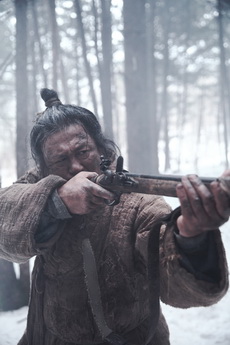 Opening in December 2015, The Tiger garnered attention from the industry as the ace-screenwriter-turned-director Park Hoon-jung's follow-up to New World (2013), with Choi Min-sik in the lead again expected to provide a stirring, Grand Bell Prize-worthy performance. Somewhat surprisingly, despite relatively good words of mouth, The Tiger's box office records fell far behind its profit-turning point, selling 1.7 million tickets and earning back less than 73% of its alleged production budget during the theatrical run (in South Korea it is virtually impossible for a film to recoup its loss through the secondary market such as DVDs or paid streaming services).
Opening in December 2015, The Tiger garnered attention from the industry as the ace-screenwriter-turned-director Park Hoon-jung's follow-up to New World (2013), with Choi Min-sik in the lead again expected to provide a stirring, Grand Bell Prize-worthy performance. Somewhat surprisingly, despite relatively good words of mouth, The Tiger's box office records fell far behind its profit-turning point, selling 1.7 million tickets and earning back less than 73% of its alleged production budget during the theatrical run (in South Korea it is virtually impossible for a film to recoup its loss through the secondary market such as DVDs or paid streaming services).
I suspect that The Tiger's failure at the box office has little to do with its inherent lack of quality and more to do with the distribution channels tightly controlled by the large conglomerates, but I do concede that Park's opus is far from the kind of crowd-pleasing fantasy adventure that the viewers might have anticipated: neither is it a concentrated dose of thrill and suspense in the mode of Jaws. What The Tiger turns out to be is a sprawling, unruly allegory about Korea's forced, traumatic transition into modernity, with Man-deok and the big tiger presented as a set of metaphorical Siamese twins.
The film's first half, featuring the gradual introduction of Man-deok's hunting skills, his love for Seogi, and the seasonal depictions of the ecology of the Jirisan Mountain, is quite well done and even occasionally moving. Choi Min-sik's impressively physical performance as Man-deok makes the latter utterly believable as a simple man of nature, with zero social ambition or material greed, overflowing with an uncomplicated love for his son, yet capable of viciously precise self-control when pinning down his prey with a bullet. Seong Yu-bin is likewise excellent as his son, tragically too intelligent to be satisfied with his lot to be shunted off into the shadow of modern Korean history. On the other hand, like most recent Korean films set in the colonial past, Japanese (and Korean collaborator) characters in the film are mostly cyphers. After having invited someone as seasoned as Osugi Ren to play a Japanese villain, Park disappointingly fails to give him a juicy enough role: Maezono is no different from countless other Japanese military hardass figures that populate Korean films of this type.
The film's technical achievement is not exactly magical but neither is it something to sneeze at. The CGI-rendered tigers (supervised by the 4th Creative Party) are impressive in their bodily details, "facial expressions," and sound designs: they are visible improvements from such past examples as the killer boar from Chaw (2009) or the rather papier-mache-like tiger in War of the Arrows (2011), although they don't still quite look like real animals in certain key shots. DPs Lee Mo-gae (A Tale of Two Sisters, I Saw the Devil) and Kim Woo-hyung (The Front Line) mix harsh vistas of the snowbound mountain-scape with sheer resplendence of the golden and crimson foliage, doing their best to lend credence to the film's overtly magical-realist moments.
Unfortunately, about the two-thirds point Park loses the grip on the narrative and allows its allegorical aspects to overwhelm and drag down the film. Most damningly, the Mountain Lord begins to behave like a Disney animal actor, betraying its earlier, fleeting impression as a near-supernatural, mysterious presence. We could also have done without the cringe-inducing "silent dialogue" scenes between Choi and the CGI tiger, and dragged-out, dour spectacles of the last forty minutes or so, beginning with the second big massacre sequence, which serves no purpose other than reiterating that this cat means business. Alas, Park is no Spielberg as far as generating suspense from a special effects-created phantom is concerned.
The Tiger is clearly closer to Park Hoon-jung's heart than some of his other films: to be sure, it still contains the hot core of a grandiose yet mournful epic that it could have been within its unwieldy frame. What the film required was a director with a cool, restrained vision of his/her own that could have quenched, molded and expanded this molten core into an efficiently constructed yet emotionally resonant masterwork. In that sense, Park still seems to have some distance to travel as a director to catch up with his own considerable talent as a screenwriter. (Kyu Hyun Kim)